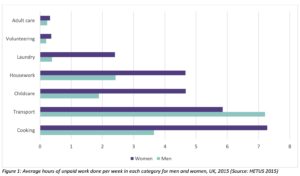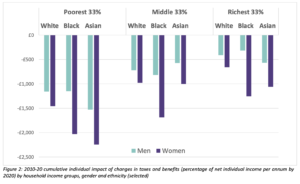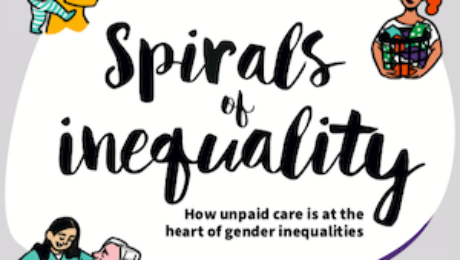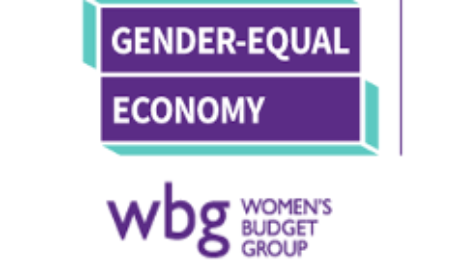Spirals of Inequality: A Women’s Budget Group Special Report
The Women’s Budget Group Commission on a Gender-Equal Economy, launched in February 2019, is an expert-led project aimed at developing economic policies that promote gender equality across the United Kingdom. The Commission utilizes a number of avenues and tools to achieve this objective, one of which is the recent release of the report “Spirals of Inequality: How Unpaid Care is at the Heart of Gender Inequalities.”
This first report released by the Commission seeks to trace the problem of how gender inequalities in the UK are produced and maintained by observing the problem through the following perspectives:
Unpaid Work: Women Continue to do the Lion’s Share
The unequal division of labor within unpaid care work is at the heart of gender inequality in the UK, with women taking on 60% of the unpaid work on average. This includes care work, cooking, and cleaning among other tasks.
 This proportion of unpaid work has increased between 2000 and 2015. Seeing that unpaid work is indispensable to both the function of society and the economy, feminist economists have argued for unpaid work to have recognition in systems of national accounting. These campaigns have led to the UK Office for National Statistics to develop estimates; the most recent from 2014 valuing unpaid care work £1.01 trillion.
This proportion of unpaid work has increased between 2000 and 2015. Seeing that unpaid work is indispensable to both the function of society and the economy, feminist economists have argued for unpaid work to have recognition in systems of national accounting. These campaigns have led to the UK Office for National Statistics to develop estimates; the most recent from 2014 valuing unpaid care work £1.01 trillion.
Limiting Opportunities for Paid Work: Women More Likely to Work Part-Time and Earn Less
This phenomenon puts a disproportionate strain on women and contributes to gender inequality. Mothers with young children are 3-4 times more likely to work part-time, and women, in general, are far more likely to be in precarious forms of employment such as temporary work. This is especially true for women of color. The part-time work conundrum is driving the gender gap, and on average women earn 43% less than men. Furthermore, a pay gap of 8.9% persists, further exacerbating this issue. Again, this being more predominate with women of color.
Despite women becoming increasingly educated, they persist in being overrepresented in low-wage sectors of the economy such as health and social work. Feminist economists have argued that a reason behind this is such sectors are viewed as an extension of a women’s “natural” work.
These issues create a perpetual cycle that allows for the inequality between men and women to continue.
Life Course Implications: Benefits Make Up a Larger Portion of Income and Austerity Hits Harder
Among single households living in poverty, those led by women make up for 86%. Furthermore, pensioners living alone are far more likely to be at the poverty level if that individual is a woman. Since tax reforms began in 2010 throughout the UK, women have also been hit hardest. These benefits make up a large portion of women’s incomes and cuts to these benefits and tax giveaways benefit those fitting into a higher wealth bracket.

Public Services: Women Hit Hardest by Cutbacks
Cuts to public spending throughout the UK have also hit women disproportionately hard, as women are most likely to utilize public services. The poorest families and especially those in poverty-level households led by women have taken a particularly bad hit; many single mothers have had to cut living standards by up to 10% as a result of a cut to public services between 2010 and 2017.
Furthermore, these cuts have put a greater burden on family members to provide care for the elderly members of their family, much of this falling onto female members. This often comes at the expense of their own employment.
Violence Against Women: “Cause and Consequence” of Women’s Economic Equality
All of the factors that lead to the economic disparity between men and women also make it increasingly difficult for women to leave abusive partners. Furthermore, poorer households have higher rates of domestic abuse, and this perpetuating poverty limits women’s options while increasing their vulnerability.
Moving Forward: Next Steps for the Commission
The WBG Commission on a Gender-Equal Economy is striving to develop an alternative economic approach aimed at addressing these issues. Through this initiative, they aim to build an economy that is desirable, economically feasible, and necessary for fairness, sustainability, and resilience. To learn more about the Commission and its work, sign up to attend the upcoming webinar “Creating a Caring Economy: A Call to Action” on September 30, 2020.
This blog was authored by Jenn Brown, CWE-GAM Communications Assistant
- Published in Child Care, Feminist Economics, Gender Inequalities, Gender-Equal Economy
Webinar (09/30/2020): Creating a Caring Economy
On Wednesday, September 30th at 10:00 -11:30 am BST, the Women’s Budget Group (WBG) will be a hosting a webinar titled “Creating a Care Economy” which will discuss the work being done within the Commission on a Gender-Equal Economy and the launch of its digital final report. This report comes at a unique time in our history, amidst a devastating global pandemic and on the brink of a harsh economic recession. The commission has taken this unprecedented time to pose the question: “do we really want to go back to business as usual?”
The Women’s Budget Group, (WBG) based out the United Kingdom, is an independent network of policy experts, academic researchers, and campaigners, harboring a vision of a “caring economy that promotes gender equality.” This non-profit organization works hard toward producing vigorous analysis intended to influence policymakers while also building the knowledge and confidence of individuals to talk about feminist economics. WBG achieves this through offering training and creating resources that are accessible and informative.
In February of 2019, WBG launched the Commission on a Gender-Equal Economy. This project works proactively to develop policies that promote gender equality across the UK, and is the first of its kind. This commission is chaired by Diane Elson.
The commission has thus far produced a number of helpful resources. To begin they have produced a short video entitled Spirals of Inequality which delves into how unpaid care is at the heart of gender inequality. This video is also accompanied by a short brief and a longer, more in-depth accompanying paper. They also have an ongoing blog, and have commissioned a number of papers focusing on four areas: Public Services, Social Security and Taxation, and an Enabling Environment. Additionally, they have gathered a number of calls for evidence, which collects evidence from many experts in varying sectors.
The final report that will be explored within this upcoming webinar will lay out a roadmap in which to build a more caring economy, outlining out the how, the why, and acting as a call to action across all the four nations encompassed within the United Kingdom.
Learn more and register for the webinar here.
- Published in Events, Gender-Equal Economy


